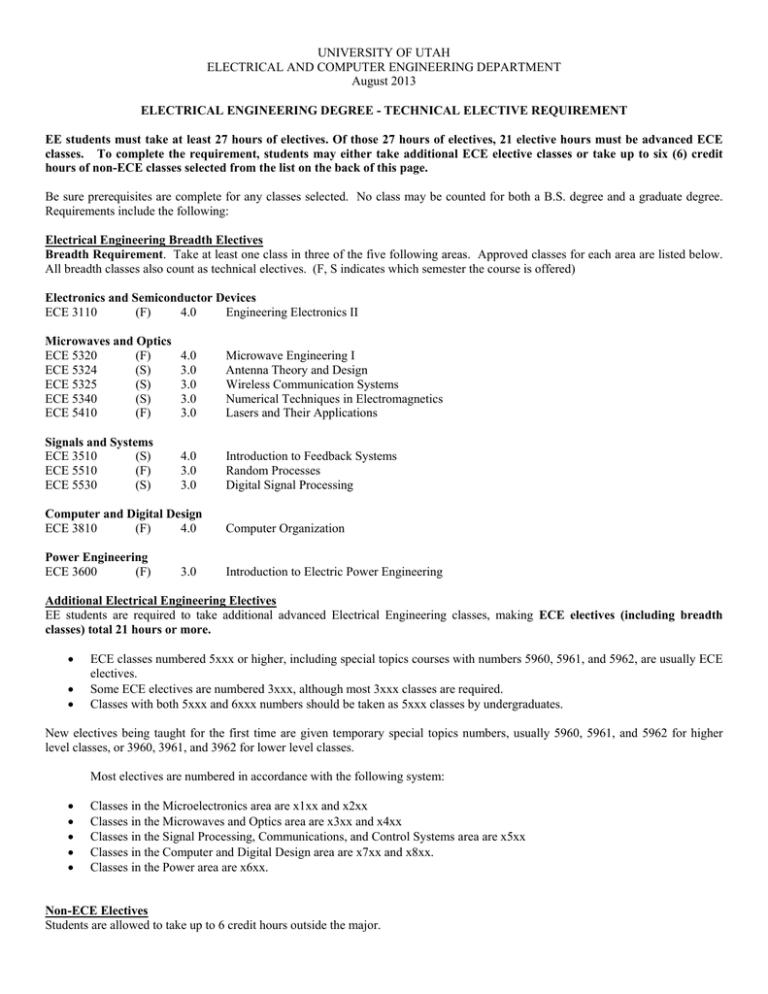UNIVERSITY OF UTAH ELECTRICAL AND COMPUTER
advertisement

UNIVERSITY OF UTAH ELECTRICAL AND COMPUTER ENGINEERING DEPARTMENT August 2013 ELECTRICAL ENGINEERING DEGREE - TECHNICAL ELECTIVE REQUIREMENT EE students must take at least 27 hours of electives. Of those 27 hours of electives, 21 elective hours must be advanced ECE classes. To complete the requirement, students may either take additional ECE elective classes or take up to six (6) credit hours of non-ECE classes selected from the list on the back of this page. Be sure prerequisites are complete for any classes selected. No class may be counted for both a B.S. degree and a graduate degree. Requirements include the following: Electrical Engineering Breadth Electives Breadth Requirement. Take at least one class in three of the five following areas. Approved classes for each area are listed below. All breadth classes also count as technical electives. (F, S indicates which semester the course is offered) Electronics and Semiconductor Devices ECE 3110 (F) 4.0 Engineering Electronics II Microwaves and Optics ECE 5320 (F) ECE 5324 (S) ECE 5325 (S) ECE 5340 (S) ECE 5410 (F) 4.0 3.0 3.0 3.0 3.0 Microwave Engineering I Antenna Theory and Design Wireless Communication Systems Numerical Techniques in Electromagnetics Lasers and Their Applications Signals and Systems ECE 3510 (S) ECE 5510 (F) ECE 5530 (S) 4.0 3.0 3.0 Introduction to Feedback Systems Random Processes Digital Signal Processing Computer and Digital Design ECE 3810 (F) 4.0 Computer Organization Power Engineering ECE 3600 (F) Introduction to Electric Power Engineering 3.0 Additional Electrical Engineering Electives EE students are required to take additional advanced Electrical Engineering classes, making ECE electives (including breadth classes) total 21 hours or more. ECE classes numbered 5xxx or higher, including special topics courses with numbers 5960, 5961, and 5962, are usually ECE electives. Some ECE electives are numbered 3xxx, although most 3xxx classes are required. Classes with both 5xxx and 6xxx numbers should be taken as 5xxx classes by undergraduates. New electives being taught for the first time are given temporary special topics numbers, usually 5960, 5961, and 5962 for higher level classes, or 3960, 3961, and 3962 for lower level classes. Most electives are numbered in accordance with the following system: Classes in the Microelectronics area are x1xx and x2xx Classes in the Microwaves and Optics area are x3xx and x4xx Classes in the Signal Processing, Communications, and Control Systems area are x5xx Classes in the Computer and Digital Design area are x7xx and x8xx. Classes in the Power area are x6xx. Non-ECE Electives Students are allowed to take up to 6 credit hours outside the major. UNIVERSITY OF UTAH ELECTRICAL AND COMPUTER ENGINEERING DEPARTMENT October 31, 2013 APPROVED NON-ECE ELECTIVES ELECTRICAL ENGINEERING DEGREE Taking non-ECE electives is optional, NOT required. Do not take two classes covering similar material. Class No. Hours Class Name BIOEN 5090 BIOEN 5101 BIOEN 5201 3 4 4 Biophysical Chemistry Engineering Principles in Bioinstrumentation Biomechanics BIOL 1210 BIOL 2001 BIOL 2010 BIOL 2020 BIOL 2030 4 4 3 3 3 Principles of Biology Principles of Biology I: Cell Biology and Genetics Evolution & Diversity of Life Principles of Cell Biology Genetics CHEM 1215* CHEM 1220 CHEM 2310 CHEM 2320 CHEM 3060 CHEM 3070 1 4 4 4 4 4 General Chemistry Lab I General Chemistry II Organic Chemistry I Organic Chemistry II Physical Chemistry I Physical Chemistry II CH EN 2300 CH EN 2800 CH EN 3353 CH EN 5657 2 3 3 4 Thermodynamics I Fundamentals of Process Engineering Fluid Mechanics Nuclear Engineering I CS 2100 CS 2420 CS 3500 CS 5100 CS 5300 CS 5310 CS 5320 CS 5460 CS 5480 CS 6210 CS 6370 3 4 4 3 3 3 3 4 3 3 3 Discrete Structures Intro to Algorithms & Data Structures Software Practice Foundations of Computer Science Artificial Intelligence Robotics Computer Vision Operating Systems Computer Networks Advanced Scientific Computing I Geometric Computation for Motion Planning CVEEN 2140 CVEEN 5850 3 3 Strength of Materials Engineering Law & Contracts ENGIN 5020 GEO 5250 3 3 Emerging Tech & Bus. Mgmt. Inversion Theory & Applications *DARS catalog year 2011-2012 and later. Class No. Hours Class Name MATH 3210 MATH 3220 MATH 4200 MATH 4510 MATH 5030 MATH 5040 MATH 5080 MATH 5210 MATH 5310 MATH 5600 MATH 5740 MATH 5760 4 4 3 3 3 3 3 4 3 4 3 3 Foundations of Analysis I Foundations of Analysis II Introduction to Complex Variables Introduction to Topology Actuarial Mathematics Stochastic Processes & Simulation I Statistical Inference I Introduction to Real Analysis Introduction to Modern Algebra I Survey of Numerical Analysis Mathematical Modeling Introduction to Mathematical Finance I ME EN 1300 ME EN 2080 ME EN 3300 ME EN 3650 ME EN 3700 ME EN 5000 ME EN 5030 ME EN 5220 ME EN 5510 ME EN 6960 4 4 4 4 4 3 3 3 3 3 Stats and Strengths of Materials Dynamics Strength of Materials Heat Transfer Fluid Mechanics Engineering Law & Contracts Reliability Engineering Robotics Introduction to Finite Elements Geometric Computation for Motion Planning MSE 2010 MSE 3210 4 3 Introduction to Materials Science & Eng. Electronic Properties of Solids NUCL 3000 NUCL 3100 NUCL 3200 3 3 3 Nuclear Principles in Engineering and Science Introduction to Neutron-Based Engineering Radiochemistry with Laboratory I PHYS 3150 PHYS 3410 PHYS 3719 PHYS 3760 PHYS 4060 PHYS 5110 PHYS 5510 PHYS 5520 PHYS 5590 PHYS 6770 3 4 4 3 3 3 3 3 3 3 Energy and Sustainability Modern Optics I and II Undergraduate Laboratory Principles of Thermo & Statistical Mechanics Observational Astronomy for Scientists Introduction to Nuclear & Particle Physics Solid-State Physics I Solid-State Physics II Introduction to Astrophysics Optical Measurement Tech & Instruments
